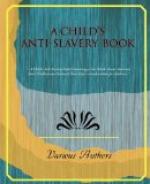“Dear papa, tell us a story with a poor slave in it, won’t you? and I will give you as many kisses as you please,” said Cornelia, twining her arms around her father’s neck.
“No, no, papa, not about the slave, but the poor Indian, who has been far worse treated than the slave was or ever will be. Only to think of the white people coming here, plundering their villages, and building on their hunting grounds, just as if it belonged to them, when all the while it was the Indians’. Now, if they had bought it and paid for it, honorably, as William Penn did, it would have been a different thing; but they got it meanly, and I’m ashamed of them for it,” said Alfred, his eyes flashing and his cheeks glowing with indignation.
“All that you have said is true, my son, but the Indians were also guilty of great cruelty toward the white people,” said Mr. Ford.
“But, papa, don’t you think the Indians had good cause for their hatred to the whites?” asked Harry.
“Why, Harry, they had no reason sufficient to justify them in their cruel and vindictive course; but they did no more than was to be expected from an entirely barbarous nation, and I am sure they had no good example in the conduct of the white people, from whom much better behavior might have been expected.”
“Well, papa, what were some of the wrongs that the Indians endured!”
“The Indians regarded the whites as intruders, and maddened by some acts of injustice and oppression committed by the early settlers, they conceived a deadly hatred, which the whites returned with equal intensity; and for each crime committed by either of them, the opposite party inflicted a retribution more terrible than the act which provoked it, and the Indian, being less powerful, but equally wicked, was the victim.”
“Well, although I think the Indians were very wicked, I pity them, but I feel a great deal more for the poor slave,” said little Cornelia.
“I think they were very cruel, sis, but I still think that they were very badly treated,” said Alfred.
“There is no doubt of that,” answered his father; “but, my son, when you began the argument you said that you thought the Indians were more deserving of compassion than the Africans. Now this is the difference. The Indians were always a warlike and treacherous race; their most solemn compacts were broken as soon as their own purposes had been served. And they were continually harassing the settlers; indeed they have not ceased yet, for at the present time they are attacking and murdering the traders who cross the plains, if they are not well armed, and in sufficiently large companies to keep them in check. Now the Americans had never this cause of complaint against the Africans, for, although like all heathen, they were debased, and were cruel and warlike among each other, they never annoyed us in America. And the Americans had not, therefore, even this insufficient excuse for enslaving them.




